商务英语口译Unit 11 Economic and Trade Policy
- 格式:ppt
- 大小:208.00 KB
- 文档页数:8
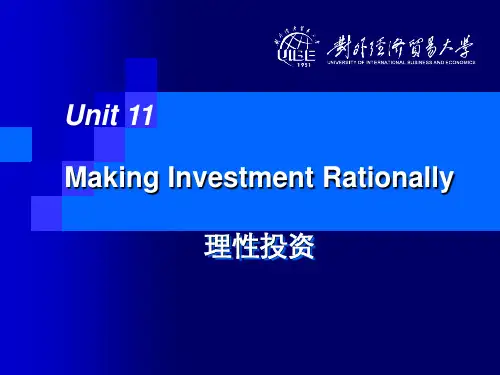
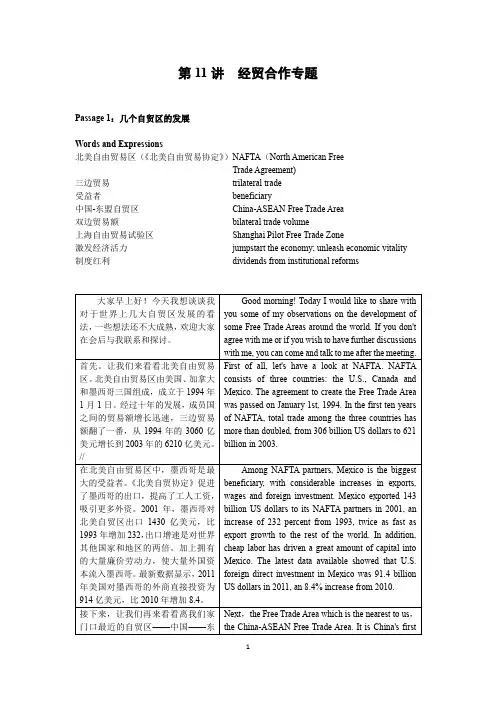
第11讲经贸合作专题Passage 1:几个自贸区的发展Words and Expressions北美自由贸易区(《北美自由贸易协定》)NAFTA(North American FreeTrade Agreement)三边贸易trilateral trade受益者beneficiary中国-东盟自贸区China-ASEAN Free Trade Area双边贸易额bilateral trade volume上海自由贸易试验区Shanghai Pilot Free Trade Zone激发经济活力jumpstart the economy; unleash economic vitality 制度红利dividends from institutional reformsPassage 2: 谈谈中国经济的几个问题Words and Expressions人力资源和社会保障部Ministry of Human Resources and Social Security城镇登记失业率registered urban unemployment rate消化过剩产能reduce excess capacity, tackle over-capacity加强节能环保strengthen energy conservation and environ-mental protection 职业生涯规划career planning自主创业start one's own business; be self-employed后顾之忧concern养老care for the old; senior care; elderly care养老保险pension; old-age insurance公立养老院public nursing home; public care home;government-funded seniors' home; retirementhome with public funding朝阳产业nascent industry; new and burgeoning industry; promising industry;be growing and thriving今天,我想就大家关心的热门话题谈谈我的看法。
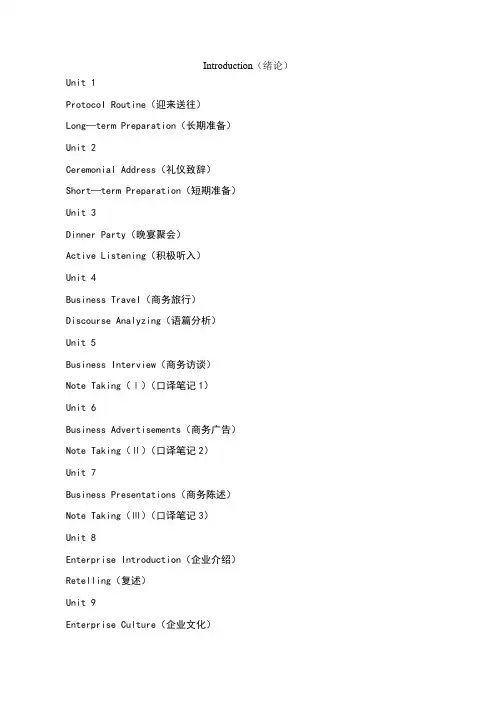
Introduction(绪论)Unit 1ProtocoI Routine(迎来送往)Long—term Preparation(长期准备)Unit 2Ceremonial Address(礼仪致辞)Short—term Preparation(短期准备)Unit 3Dinner Party(晚宴聚会)Active Listening(积极听入)Unit 4Business TraveI(商务旅行)Discourse Analyzing(语篇分析)Unit 5Business Interview(商务访谈)Note Taking(Ⅰ)(口译笔记1)Unit 6Business Advertisements(商务广告)Note Taking(Ⅱ)(口译笔记2)Unit 7Business Presentations(商务陈述)Note Taking(Ⅲ)(口译笔记3)Unit 8Enterprise Introduction(企业介绍)Retelling(复述)Unit 9Enterprise Culture(企业文化)Public Speaking(公开演讲)Unit 10Marketing & Promotion(市场营销)Paraphrasing(一句多译)Unit 11Business Negotiation(商务谈判)Figures Interpreting (数字口译)Unit 12Business Meeting(商务会议)Idioms Interpreting(成语口译)Unit 13Investment&Profits(投资利润)Fuzzy Interpretation(Ⅰ)(模糊表达1)Unit 14Business Policy(商务政策)Fuzzy Interpretation(Ⅱ)(模糊表达2)Unit 15International Exhibition(国际会展)Fuzzy Interpretation(Ⅲ)(模糊表达3)Unit 16Public Relations(公共关系)Sight interpreting《视译练习)Unit 17Business Strategy(商务策略)Shadowing(影子跟读)Unit 18Transportation & Logistics(交通物流)Quality Assessment (质量评估)U n i t F o u rB u s i n e s s T r a v e lUnit Objectives (单元目标)After reading this unit, you shouldunderstand the ways to identify the main ideas of the source text.find ways to improve your interpreting skills and performance.master the basic words and expressions about business travel.know some cultural background knowledge about business travel.reparingI. Interpreting Skills (口译技能)Read the following presentation about discourse analysis and try tounderstand the four speech types and know how to identify the main ideasof the source text. Then complete the following task:1. Listen to the passage, “My first day in New York”, and answer thefollowing questions:1). When did the author first arrive in the US2). What did the author do on the way to his hotel3). Where did the author get something to eat after his friend had left4). Why couldn’t he have what he really wanted at the restaurant5). What did the author do after dinner2. Listen to the passage again and try to catch more details, and thenretell the story in your own words.Decoding Training (II): Discourse Analysis(语篇分析)Interpreting is to “understand and make understood”. To interpret the speech, one must first understand the message of the speech. However, comprehension(理解)of the source discourse goes beyond the simple recognition of words and linguistic structures. The interpreter shall make an analysis of the source discourse. More importantly, the interpreter shall identify(识别)the speech type and know how to identify the main ideas of the original speeches.Identification of the Speech TypesSpeeches are diversified serving different occasions and purposes. It will be of great help to the interpreters if they know the speaker’s style. In most cases, speechesare prepared beforehand. Therefore, a study of the different types of writing helps an interpreter identify the main idea of a given speech. Following are the basic types of writing.1. Descriptive WritingDescriptive(描述性的)writing involves a great deal of detailed information. A descriptive discussion aimed at providing details of an event, a scene, a procedure, or a situation.This speech type demands a thorough background investigation of the speaker and the relevant situation by the interpreter.2. Narrative WritingNarrative(叙述性的)writing focuses on the development of events. There is no doubt that the interpreter should be very sensitive to dates, time phrases, and verb tenses when a narrative speech is dealt with.3. Expositive WritingExpositive(说明性的)writing deals with its subject matter in such orders as chronological, spatial, comparison, and definition. It would be to the advantage of the interpreter to conduct a background investigation of the speaker and the situation, for that would provide the interpreter with not only the necessary glossary but also the speaker’s standpoint(立场).4. Persuasive WritingPersuasive(劝说性的)writers always want to make their arguments clear, strong and convincing. When the purpose is to convince, writers of persuasive writing mainly employ two techniques -- induction(归纳)and deduction(推论). Inductive writing starts with specific examples or points to draw a general conclusion, while deductive writing illustrates its thesis at first and then supports and reinforces the thesis through specific examples or subordinate ideas.Identification of the Main IdeasIn the context of interpreting, the main ideas of the source speech can be identified at the sentence level and at the discourse level. Priority should always be attached to identifying the main idea at the sentence level. We argue that identification of main ideas be done on the basis of sentences. Training in identifying the main ideas in interpreting should naturally take place first at the sentence level.1. Sentence LevelThe most important task for an interpreter to identify the main ideas at the sentence level is to discern (洞悉) the subject, verb and object (SVO). It is highly significant for the interpreter to catch the SVO of the sentence while listening to the source text, as the SVO usually carries the major information of the sentence. For example, when listening to “The best way to carry money while traveling is to have a major credit card”, the interpreter is expected to catch “The best way is to have a credit card.”If the interpreter is able to catch the SVO of the sentence, he then will produce a complete sentence with the major information in the target language.2. Discourse LevelThere are also some skills an interpreter might employ on different occasions for grasping the gist(要点)of a speech at the discourse level. In a well-organized speech, the speaker usually explains his point in the first few sentences. Therefore, one of the ways to get the main idea of a speech is to attach priority to the beginning of the speech. Secondly, if the interpreter encounters a speech that is inductively constructed, the interpreter should, to the best of their ability, conduct a study of the speaker's background and viewpoints so that they can follow the speaker's logical guidelines.II. Phrase Interpreting (短语口译)Work on the following words and phrases. Interpret them into Chinese andEnglish respectively.A. English to Chinese1. Have a population of…2. Cover an area of…3. Date back to…4. Have a history of…5. Be situated in…6. The gross domestic product7. Dive-in restaurant 8. Quarantine certificate9. Duration of stay 10. Residence permitB. Chinese to English1、日程安排2、旅行路线3、起飞时间4、机场大楼5、候机室6、贵宾室7、问讯处 8、安全检查9、免税店 10、个人物品III. Sentence Interpreting (句子口译)Work on the following sentences. Interpret them into Chinese and Englishrespectively.A. English to Chinese1. I believe you're going out of your way for us.2. Wouldn't you like to spend an extra day or two here3. I'm afraid that won't be possible, much as we'd like to.4. I wonder if it is possible to arrange shopping for us.5. I will keep you posted.B. Chinese to English1. 我特地为你们安排,使你们在北京的逗留愉快。


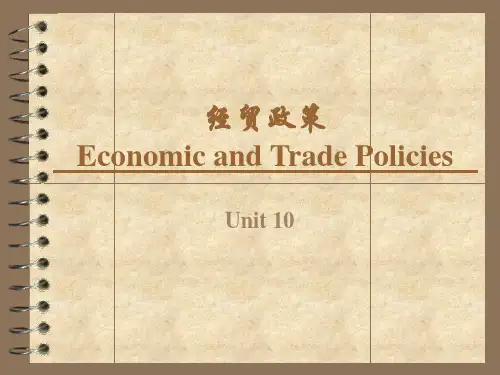
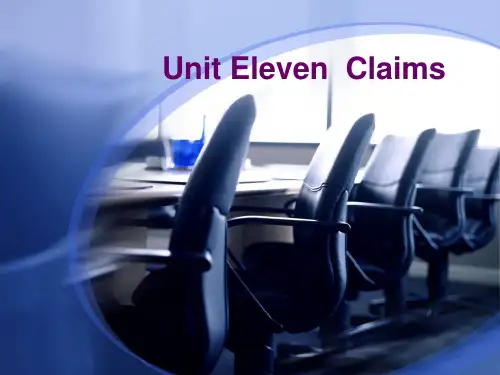
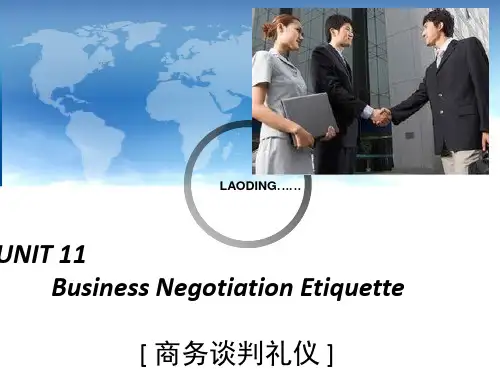
![商务翻译(英译汉)Unit 11 FAO[精]](https://uimg.taocdn.com/7d7c3b37eff9aef8941e0679.webp)


主题五经济贸易一、句子口译(一)英译汉1.是通讯技术促成了新经济。
2.电子商务带来了新的挑战。
3.电子商务会继续降低成本,对商业产生影响。
4.建立在规则基础上的国际贸易体系要求统一的监督。
5.电子商务超越时间和空间的限制。
6.经济学是一门社会科学。
7.随着产量的增长,价格下降。
8.竞争往往会淘汰效率低下的企业。
9.人口的增长速度比可供食物的增长速度快。
10.人口增长往往会危及食品供应。
11.而今,我们订购货物、接受服务,只需轻敲键盘上的几个小小塑料键而已。
12.贸易程序的简化将带来时间、金钱和人力资源上的很大节约。
13.这是一个数字革命已经引起客户期待和公司竞争的结构性变化的全球经济。
14.中国对美国的出口使美国消费者受益,并有助于美国保持低通胀率。
15.美国国债已达到10.2万亿美元,约为美国国内生产总值的91%。
16.如果某些产品和服务不盈利,人们就不会生产和提供它们。
17.人们记住托马斯.马尔萨斯的主要原因是他的人口增长理论。
18.大卫李嘉图的主要目的是促进国际贸易自由,他提出了比较优势论。
19.根据比较优势论,各国应当只生产本国最适合生产的产品。
20.在自由经济体系中,消费者任意花自己的钱,而企业为争夺消费者而竞争。
(二)汉译英1.Export still remains the top priority in the country's foreign trade and economic undertakings. 2.The utilization of foreign direct investment still maintains an upward momentum.3.New progress has been achieved in China's foreign economic and technological assistance. 4.We shall reinforce macro-economic control and adjustment and improve the industrial structure of foreign investment.5.China carries out economic cooperation of mutual benefit so as to learn from others' strong points to offset its own deficiencies.6.What is the basis for trade between nations?7.US exports to China are increasing rapidly.8.China enjoys the fastest growth as an export market of the United States among its major trading partners.9.China enjoys a trade surplus of 103.72 billion US Dollars over the United States.10. Last year China’s GDP reached 30.067 trillion Y uan, an increase of 9.0% over that of theprevious year.11.East China is well-known for its favorable conditions both geographically and ethnically.The policy of reform and opening-up has injected new vitality to the foreign economic relations and trade in this area.12.Bilateral and multilateral economic and trade relations between China and other countries have been further developed.13.The economic and trade relations between China and her neighboring countries and the vast developing countries have been further strengthened and developed.14.Foreign funded enterprises shall deepen the reforms of internal management and practice modern ways of management.15.New progress shall be made in the implementation of such strategies as market diversification and winning the market with quality.16.According to the statistics up to October last year, the United States remains the largest export market and second largest trading partner of China.17. Last year the European Union was the largest trading partner of China with the total tradevolume reaching 425.58 billion U.S. dollars, a year-on-year increase of 19.8%. 18.Bilateral investment and cooperation between China and the United States has been going on well and the United States remains one of the largest sources of foreign investment to China.19.While the trade volume between China and the United States is growing, trade frictions between the two sides are also on the rise.20.Last year China's total import and export volume reached 2.97276 trillion U.S. Dollars, an increase of 34.7% year on year.二、段落口译(一)英译汉1.全球化既提供了新的商机,也带来了新的挑战:那就是如何保持适当的社会和商业准则,以保护个体、商界和国家的利益。